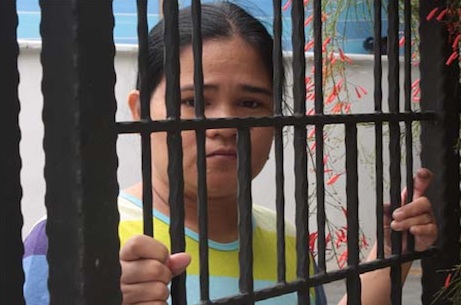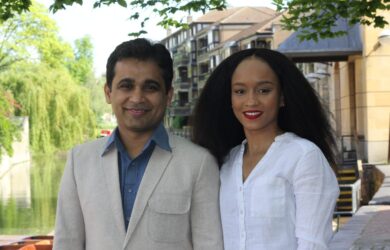
Sabrina Anjara's research has contributed to policy change on domestic workers in Singapore. Her PhD will focus on mental health in Indonesia.
As a young student, Sabrina Anjara thought research was a bit detached from real life. She has since proven herself wrong. Her master’s thesis was the first empirical study of the quality of life of foreign domestic workers in Singapore and was used by advocates of foreign workers’ rights to campaign for changes to domestic workers’ contracts.
Many domestic workers, all of whom are from outside Singapore and are subject to a two-year contract, had no rest days. Her research, assisted by the NGO Transient Workers Count Too, focused on workers who had rest days. It found that even they had a poorer quality of life compared to the general population.
Although the NGOs had been advocating for this before Sabrina’s research findings, they were doing so without any empirical data on the well-being and mental health of domestic workers. The research made their case much stronger. In 2012 a new regulation was introduced that mandates rest day provisions in contracts for foreign domestic worker effective from 1 January 2013.
Sabrina started to look into access to mental health services as a result of her research. In many Asian countries, patients have to pay for mental healthcare. She also looked at the situation in Indonesia, which is relatively more critical. In 2012, there were only around 600 registered psychiatrists to cover a population of 250 million. The prevalence of common mental health disorders is estimated at 15% of the population at any given time and there are over 37 million people who potentially need access to mental health services. However, the level of awareness and state of infrastructure cannot meet these needs. People with severe mental illness are often put in shackles, in a local practice called pasung, due to the stigma associated with mental illness.
Sabrina decided she wanted to build on her master’s research at King’s College, London to look at mental health service provision in Indonesia and how to ensure stakeholders such as NGOs and policy-makers can access evidence-based information on effective interventions. Her supervisor at King’s College, Dr Tine Van Bortel, was instrumental in inspiring Sabrina to do her initial research. She is currently at Cambridge University and is principal investigator on a World Health Organisation project on mental health. Sabrina begins her PhD at Cambridge in the autumn.
Childhood
Sabrina was born in Jakarta and lived there until she was 14. Her parents, who are part Chinese, decided that, following race riots in the country two years earlier, it was not safe for their daughters to remain in Jakarta. Many houses and shops were burnt and looted, people were attacked and women raped. “I remember having to pack up our valuables and hide in the car in the middle of the night while my father and other men went to protect our estate,” she said. “For the next year, every other night my father had to stay up to watch the estate. A Muslim neighbour invited us to seek refuge at his house if anything happened. That is when I first realised I was from an ethnic minority. I had thought all Indonesians were the same before that.”
Sabrina, whose father used to run his own business, and mother manages a number of hospitals across Indonesia, won a scholarship from the Singapore government to pursue her secondary education there. A year later, she was joined by her middle sister. Moving to another country and having to adapt overnight to being taught in a different language – English – was difficult. “I had to start thinking and dreaming in English so I would be proficient enough to sit for my O Levels,” she said. “I had two years to sort myself out.” Some other students in her class were Malaysian and Thai.
While at secondary school, Sabrina applied to do a year of foundation studies in Melbourne, Australia after a room-mate said she was moving there. She had done her research and found out that doing a foundation studies course would fast track her path to university – indeed she finished her undergraduate degree at the age of 20. She also relished the idea of challenging herself again. While she graduated from the University of Melbourne with a degree in Psychology and Asian Studies, she was advised to narrow down her focus to Psychology, which had more employment opportunities.
After her undergraduate studies, Sabrina worked as a research assistant for the late Professor Graeme Hawthorne whose research focused on quality of life instruments. He persuaded her that academic research was something that could change people’s lives. “I had always known research as being about research methods and statistics. It seemed boring to me and felt as though it had no impact, but Professor Hawthorne spoke about how his work on incontinence had got the Australian government to understand the plight of people with that problem,” she said. He and his wife, Professor Lesleyanne Hawthorne, coached her and suggested she apply to do a PhD in Psychiatry at the University of Melbourne. She did. However, she felt she was not ready to commit into the area of study. Instead she took a research post at the National University of Singapore’s medical school.
Student stress
For over two years, she worked on psychometrics for medical school admissions and observed the high levels of stress experienced by the students. She suggested to her supervisor that they should investigate how many students had mental health problems. Undeterred by the lack of support available for research in this area, she started investigating the possibility of doing further studies focusing on mental health issues as a result of work or studies.
Sabrina applied to do her MSc at the Institute of Psychiatry at King’s College in London, which offered a course on mental health in the workplace. For her research project, she chose to focus on the quality of life of foreign domestic workers in Singapore after hearing news about suicides of domestic workers in Singapore and because she felt an affinity with the workers since she had been a foreigner working in Singapore. She conducted semi-structured interviews with around 200 foreign domestic workers, mostly from the Philippines and Indonesia.
In between her MSc and starting her PhD, Sabrina has been working as a psychologist in the Ministry of Social and Family Development in Singapore. She works in the Clinical and Forensic Psychology Branch, part of the Rehabilitation and Protection Group.
Sabrina is looking forward to starting her PhD. “Through my research, I hope to provide mental health practitioners in developing countries with greater access to evidence-based programmes so they know what they are doing is effective for their target population and they are not wasting their time doing things which are not effective.” She adds that many evidence-based programmes tend to be commercialised. She would like to see international companies sponsor efforts to raise awareness and develop the capability of mental health practitioners as part of their corporate social responsibility work. “Mental health is a growing issue everywhere and embraces not just human well-being but also human rights,” she says.
Picture credit:Transient Workers Count Too.












